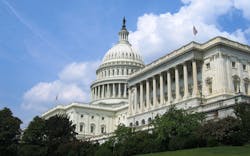Praise and criticism surround passage of 5-year highway bill
By a vote of 83-16 in the Senate and 359-65 vote in the House of Representatives last night, Congress passed the newly-rechristened Fixing America’s Surface Transportation or “FAST” Act, sending it to the White House where President Obama is expected to sign it into law.
The five-year, $305 billion act is the first long-term authorization passed by Congress since the $286.4 billion “Safe, Accountable, Flexible, Efficient Transportation Equity Act: A Legacy for Users” or “SAFETEA-LU,” back in 2005, which expired in 2009.
“It is a tremendous relief to know that with the FAST Act, state departments of transportation will have some reasonable long-term certainty regarding the levels of federal investments for surface transportation,” noted Paul Trombino, president of the American Association of State Highway and Transportation Officials (AASHTO) and director of the Iowa Department of Transportation, in a statement.
“We have long said that states, which are the primary implementers of the federal program, need a long-term federal commitment in order to plan for and invest in the kind of transportation projects the nation needs now and well into the future to support our quality of life and economic prosperity,” he added.
The Committee for a Responsible Federal Budget (CRFB), however, is one interest group that is taking a dim view of the FAST Act.
“Overall, the Congressional Budget Office (CBO) estimates that the bill saves $71 billion over ten years to finance a $70 billion transfer to the Highway Trust Fund (HTF), which will keep the fund solvent through fiscal year 2020,” CRFB noted in a recent blog post. “At the same time, the bill would increase highway contract authority by $25 billion above the baseline over the next five years, or nearly $65 billion if that amount of spending were extended out for ten years.”
The group added that increased spending in the FAST Act will “only make it more difficult for lawmakers to close the HTF shortfall in the future,” noting that its higher spending would increase the 2021-2030 shortfall by $50 billion on top of the already-existing $215 billion shortfall.
“The bill technically rescinds the increased spending in 2020, but it is unlikely that a future Congress would allow the 13% spending cut that would entail,” CRFB said. “Increasing highway spending is not necessarily irresponsible, but it is when lawmakers provide only temporary funding to do so. Instead, they should raise the gas tax or find another permanent financing source if they want to spend more.”
Yet Brian McGuire, president and CEO of Associated Equipment Distributors (AED), believes the FAST Act will help boost heavy equipment sales to the tune of $13 billion.
“This is more than a philosophical victory,” he said in a statement. “Over the next five years, the hundreds of billions of dollars in federal highway and transit investment guaranteed in the bill will stimulate more than $13 billion in equipment sales, rental and maintenance activity and support more than 4,000 dealership jobs each year.”
About the Author
Sean Kilcarr
Editor in Chief
Sean Kilcarr is a former longtime FleetOwner senior editor who wrote for the publication from 2000 to 2018. He served as editor-in-chief from 2017 to 2018.
